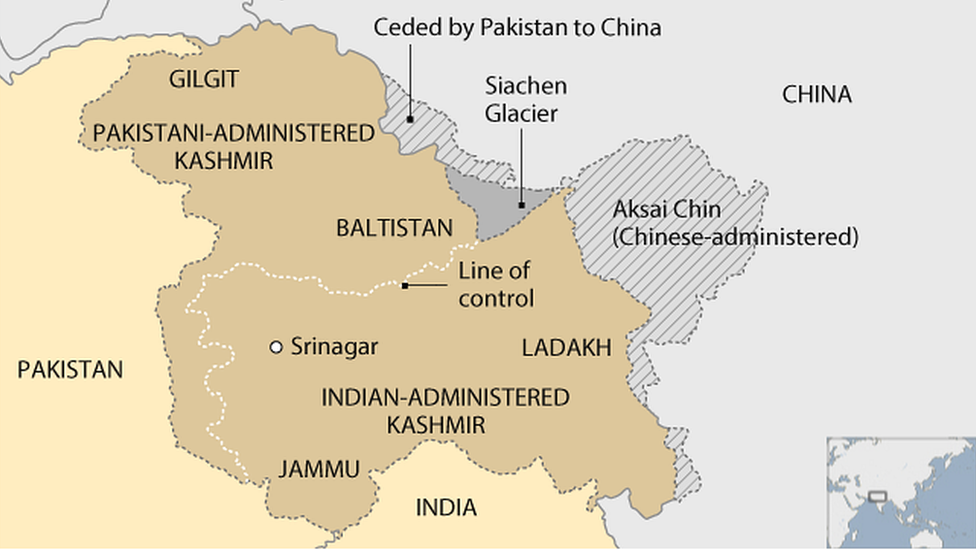Fleeing Punjab villagers fear another war with Pakistan
- Published
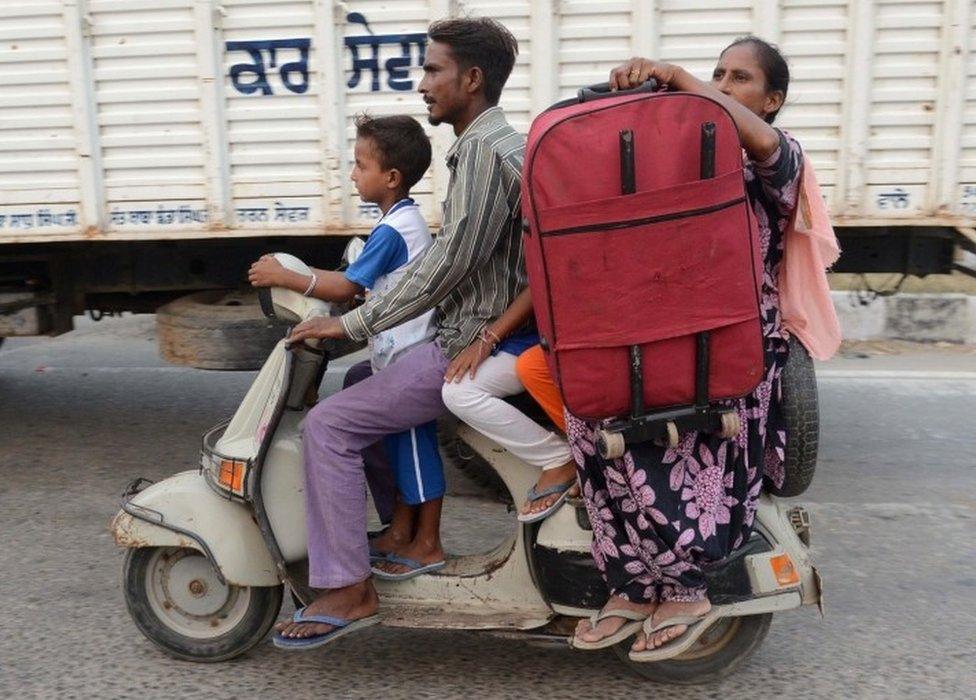
People from villages in Punjab are leaving amid fears the confrontation might escalate
Indian villagers living close to the border with Pakistan have been asked to evacuate, days after India said it launched strikes targeting militants in Kashmir. The BBC Hindi's Vineet Khare travels to the northern state of Punjab to talk to villagers who are leaving their homes.
"Why should we leave our homes? Who will feed my livestock? How long can we stay with our relatives? What if my house is burgled?"
Salvinder Singh is an angry and worried man, like many in his village Gilpun, near the India-Pakistan border in Punjab.
They had been asked to evacuate Gilpun over fears for their safety.
'Dangerous'
The undulated mud road cutting through Gilpun is in fact, lined with hired tractors and vehicles. Uncertainty loomed as villagers loaded utensils, livestock and large boxes filled to capacity with moveable items. Barring few, most have shifted.
"Our children have already left. We are going to our relatives," Kalwant Kaur tells me.
"It's dangerous here. We heard people say that on TV," adds Inderjeet Singh.
Relations between India and Pakistan have sharply deteriorated since last month, when militants carried out the deadliest attack on an Indian army base in Kashmir in years. India blamed the attack on Pakistan, which has denied the claim.
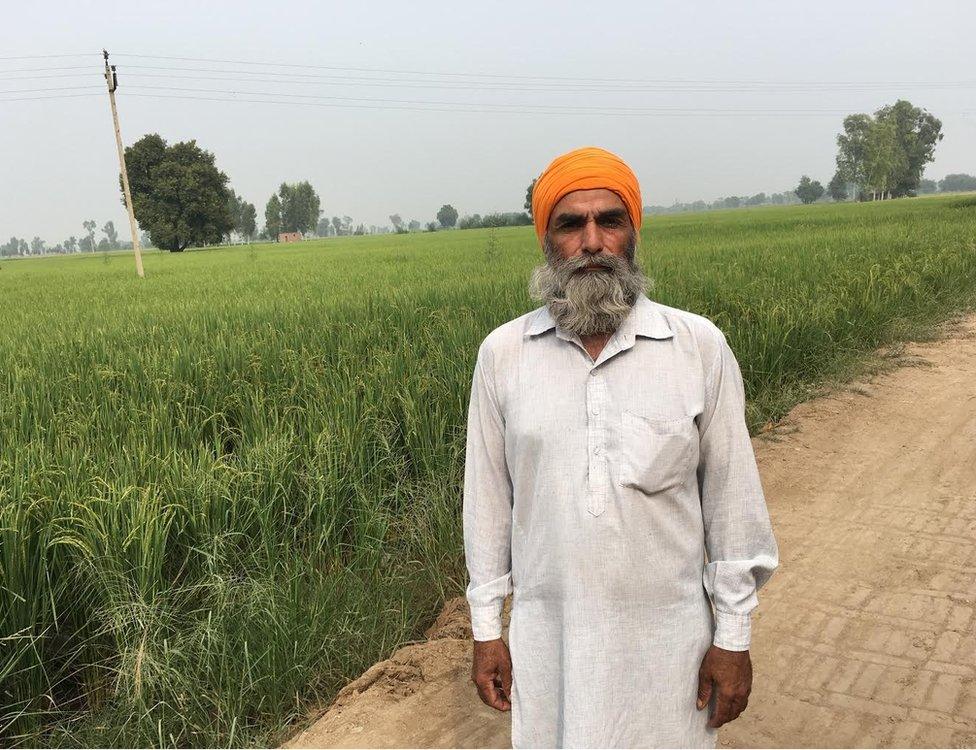
Salvinder Singh is worried about his home after he was told to evacuate for safety
Last week, India said it had retaliated by carrying out "surgical strikes" against suspected militants along the de-facto border with Pakistan in Kashmir.
Soon after, officials asked that villages falling within 10km of the 553km (343 miles) border with Pakistan be evacuated.
That has sparked panic.
Relief camps for evacuees have been set up but these are plagued by complaints of poor inhabitable conditions.
The region witnessed two full-blown wars with Pakistan in 1965 and 1971. Tensions also peaked in 2001 when India mobilised its troops along the border after an attack on the Indian parliament which India blamed on Pakistan-based militants.
The threat of another war or war like situation is never seen to be far away.
'Scared again'
Life on the border regions is hard. Literacy is low and human development indicators poor. Bad roads, lack of good hospitals and schools adds to the challenges of living here.
"We are scared again," Tarsem Singh, from another border village Daoke, tells me as he prepares to leave with some others.
Most of them were going to their relatives. Some would come back in the morning to guard their homes before leaving again by sunset.
But leaving is not an easy choice for everyone.
In Atari, the border town known and the last Indian train station for the Samjhauta Express that runs between India and Pakistan, I met a group who had first fled but returned after two days.
"We had to earn a living. We couldn't be missing for long. But we are always ready. We keep our vehicle tanks full for any emergency," one of them said.
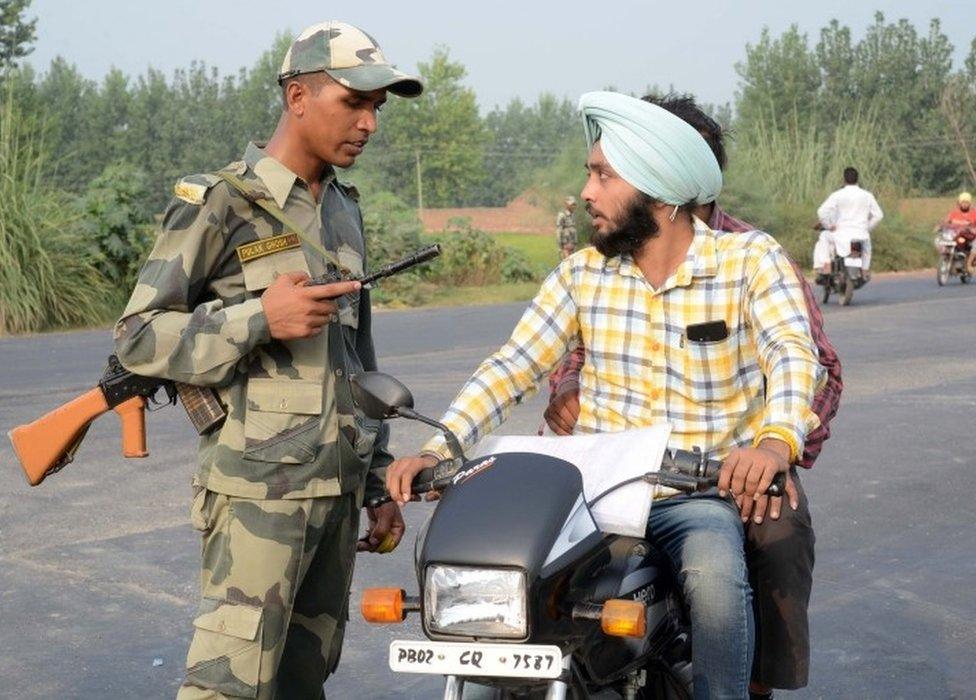
Security has been stepped up in Punjab
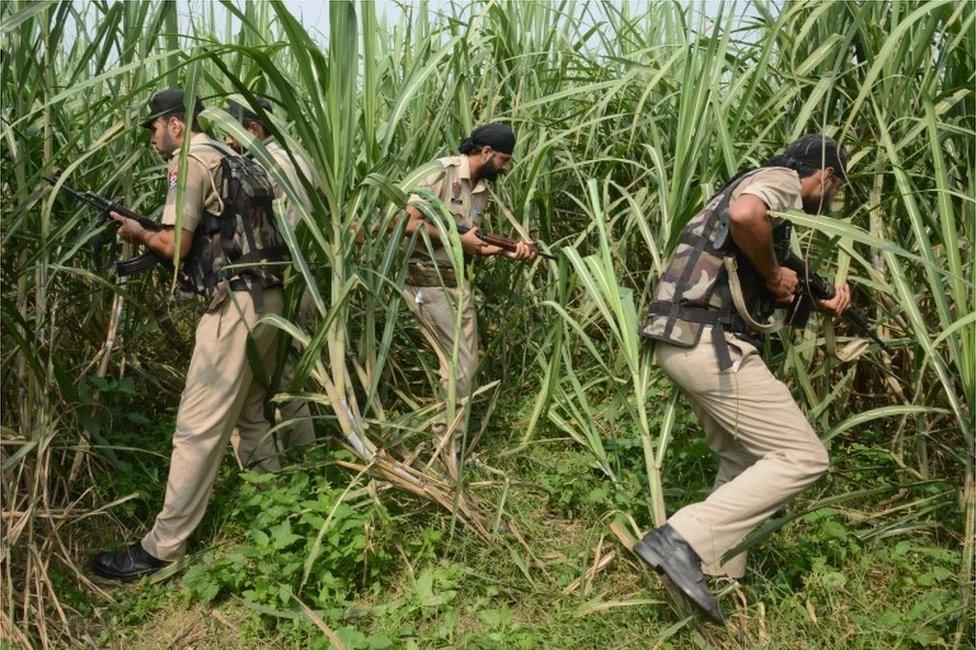
Officials have asked for villages falling within 10km of the border with Pakistan to be evacuated
Meanwhile the state government is trying to send the message that it is doing everything possible at this time of crisis. Punjab Chief Minister Parkash Singh Badal has visited the border villages.
"This was a first of a kind of strike by India, so it is possible Pakistan could hit back," says Virsa Singh Valtoha, a lawmaker with Punjab's ruling Akali Dal-BJP government.
But political scientist Jagrup Singh calls the government direction of asking people to evacuate "unprecedented as no government in the past ever asked people to leave".
'Stoking war hysteria'
He reckons nearly 2.5 million people reside in nearly 1,800 villages up to 16km from the international border.
And there is also no dearth of those accusing the government of stoking "war hysteria" when state elections are around the corner.
The absence of any troop movement on ground is fuelling these charges.
"There is no fear of war. Our work hasn't been impacted," says Gurwinder of the Atari Border Truck Association that deals in trade with Pakistan.
"Drivers coming from Pakistan say everything is fine. Media is fuelling the matter," said another association member.
"If Pakistan reacts, the government can tell people, we told you so," claimed opposition Congress' Anoop Singh Bhullar.
But Mr Valtoha denies any politics and says the state acted following an advisory from the federal government. The state government has criticised the opposition for politicising the issue.
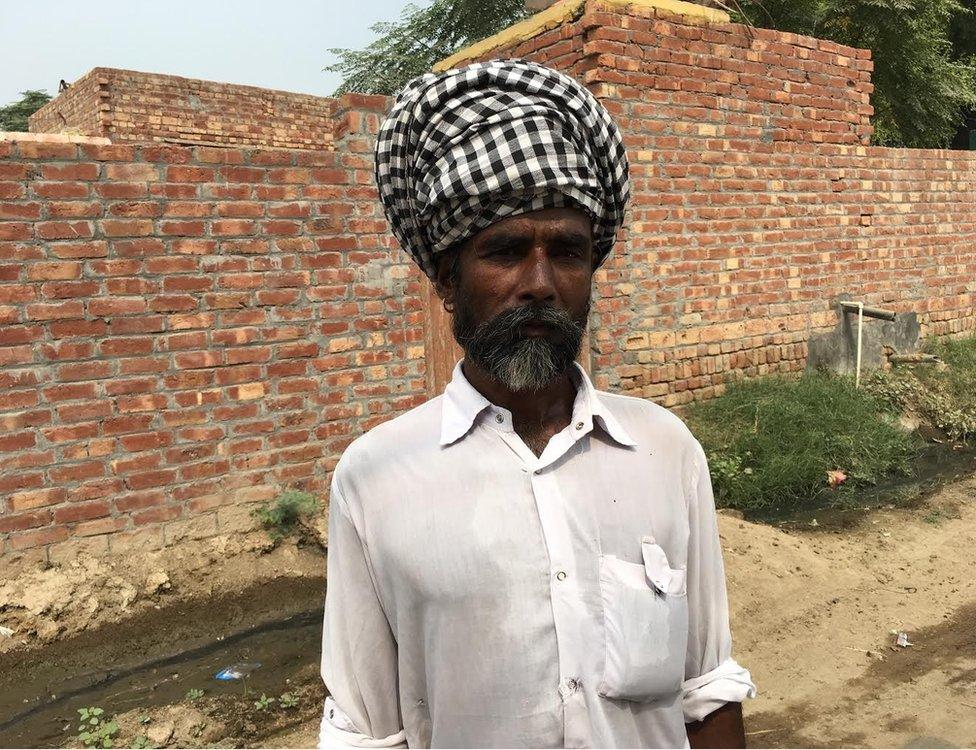
Tarsem Singh says he is 'scared' after being told to evacuate
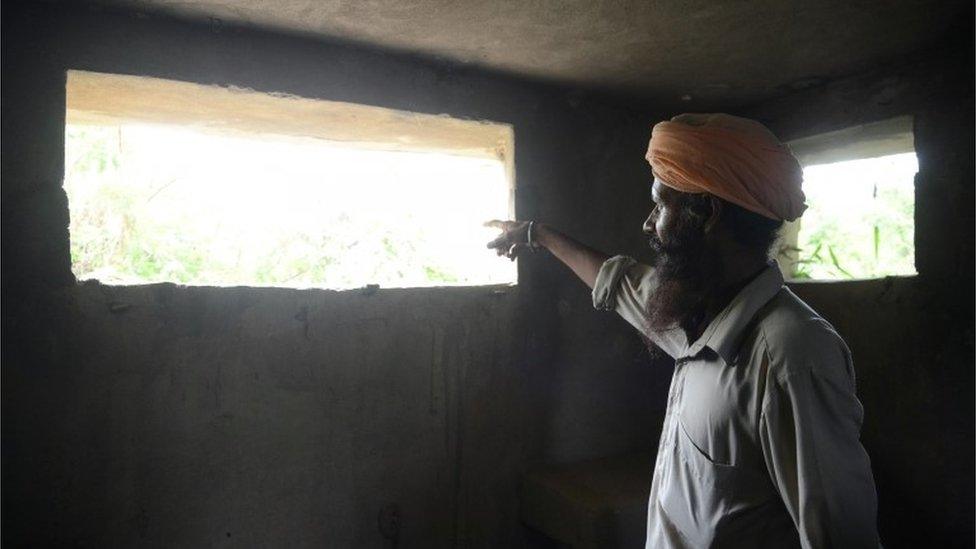
A Sikh villager looks out of a military bunker on the border in Punjab
Meanwhile the tension between Indian and Pakistan has come in at a bad time for state farmers.
"The harvest is ready and people are being asked to evacuate. Some have refused to do so. Panic is being revved up when the popularity of the government is at an all time low," said Professor Singh.

Read more:

What kicked all this off?
The 18 September attack on the army base in Uri in Indian-administered Kashmir where 18 soldiers died was the deadliest of its kind for years.
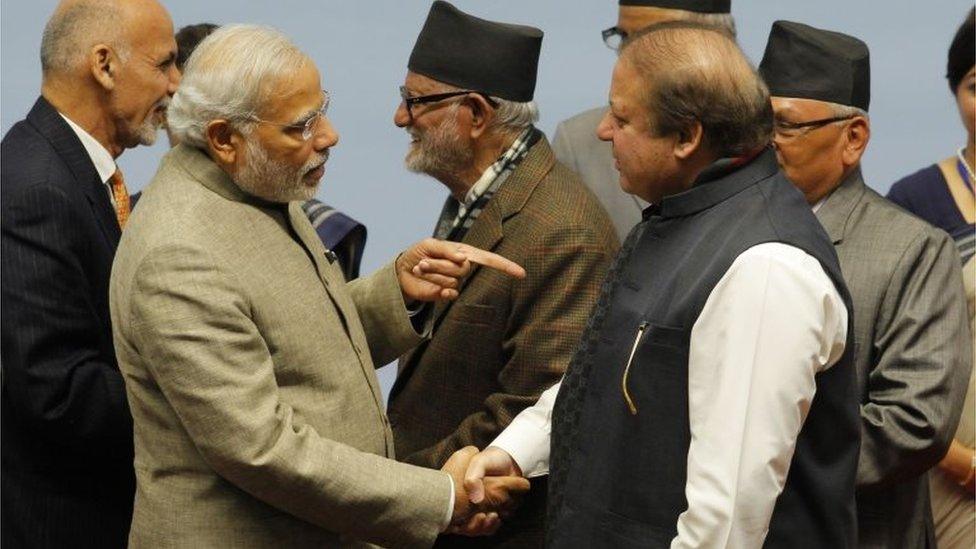
Indian PM Modi faces pressure to send a message to Pakistan
Narendra Modi's BJP government, which came to power promising a tough line on Pakistan, has been been under tremendous pressure to retaliate for what many in India believe is state-backed terrorism.
Many observers say the latest move is aimed at placating an angry domestic constituency and sending out the message that Mr Modi is a strong leader.
And many throughout the country hailed the assault as a powerful message to Pakistan.
What does Pakistan say?
Prime Minister Nawaz Sharif criticised the "unprovoked and naked aggression of Indian forces" and said his military was capable of thwarting "any evil design to undermine the sovereignty of Pakistan".
Islamabad says India's stance is a "blatant attempt" to deflect attention from human rights abuses in the region.
More than 80 people, nearly all anti-government protesters, have died in more than two months of violence against Indian rule.
Why is Kashmir so dangerous?
Both India and Pakistan claim Muslim-majority Kashmir in its entirety but control only parts of it.
The territorial dispute between the two countries has been running for over six decades, and two out of the three wars fought between the nuclear-armed rivals have been over Kashmir.
As with every stand-off in Kashmir, many people fear that this could eventually escalate into a major clash between two nuclear-armed states.
But most analysts still believe that is unlikely to happen and that sporadic clashes and diplomatic sabre-rattling are likely to continue.
- Published30 September 2016
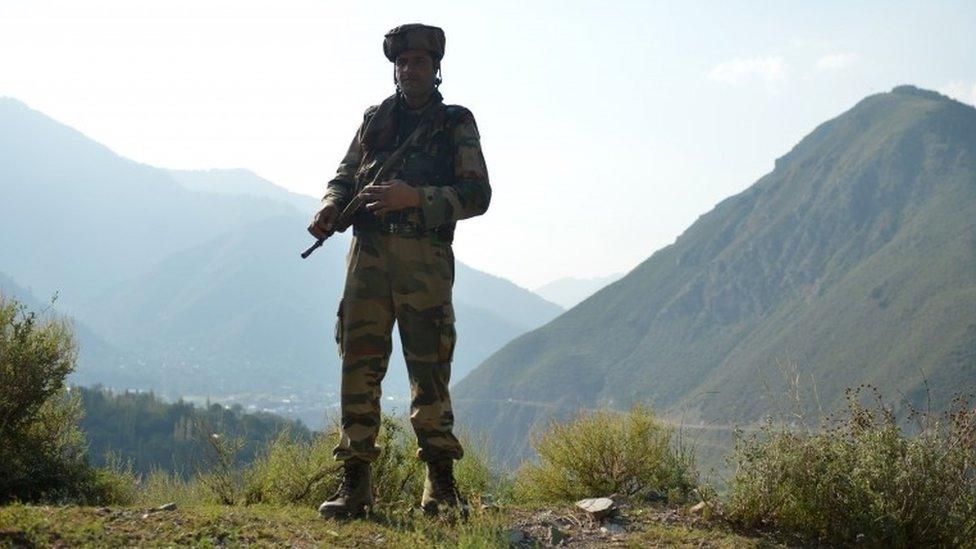
- Published19 September 2016
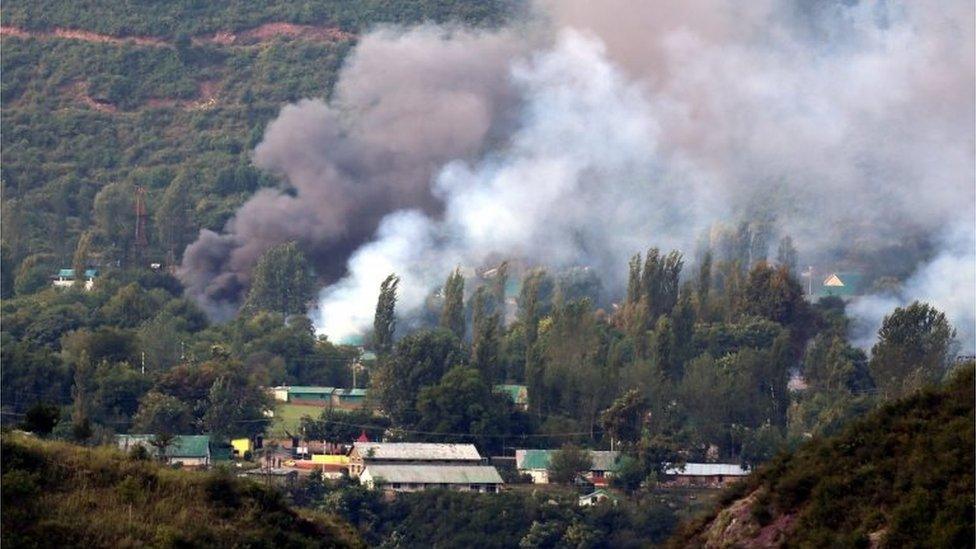
- Published20 September 2016
- Published28 September 2016
- Published10 March
